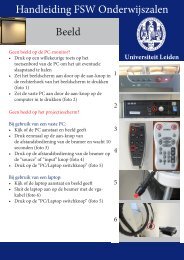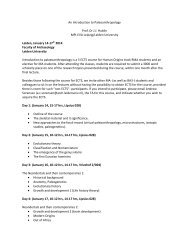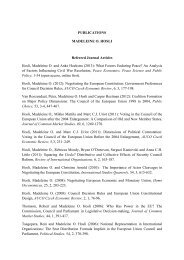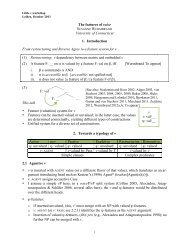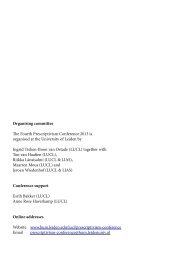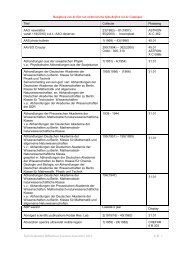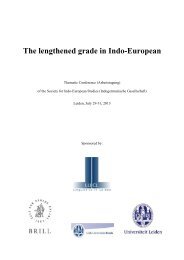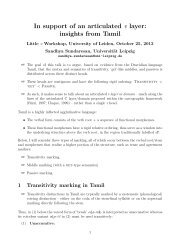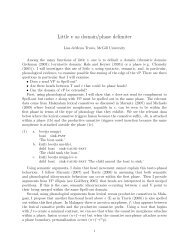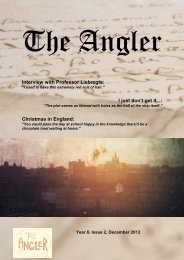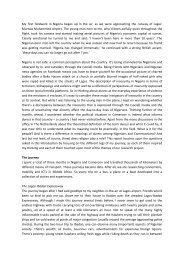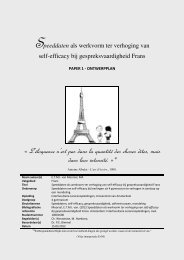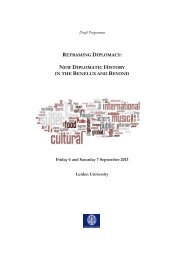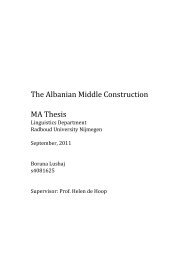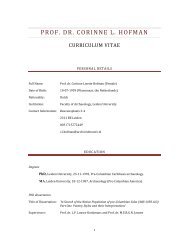LUC The hagUe ProfiLe 1
LUC The hagUe ProfiLe 1
LUC The hagUe ProfiLe 1
You also want an ePaper? Increase the reach of your titles
YUMPU automatically turns print PDFs into web optimized ePapers that Google loves.
ART. 5.4 - STANDARDS FOR NEGATIVE STUDY ADVICE<br />
1. Any student who has obtained at least 50 credits with a grade of 6.0 or above<br />
after two semesters of enrolment in the degree programme shall not receive<br />
negative P1 advice. In all other cases, negative P1 advice will normally be<br />
given.<br />
2. Suspended P1 advice can be issued to students who fail to meet the standards<br />
in 5.4.1 but for whom there are extenuating circumstances. Suspended advice<br />
can only be issued once. If at the completion of the following academic<br />
year the student has failed to pass at least 60 credits including the required<br />
compulsory courses specified in Art. 3.1 they will receive negative P1 advice.<br />
3. Students with positive P1 advice must complete an additional 50 credits<br />
credits with a grade of 6.0 or above within two enrolled semesters of that<br />
advice in order to achieve positive interim P2 advice. <strong>The</strong> 100 credits completed<br />
must include all the required compulsory courses specified in Art. 3.1<br />
(Core and General Education). In all other cases, negative study advice will<br />
normally be given.<br />
4. Failure to achieve positive interim P2 advice, without extenuating circumstances,<br />
will result in a student being placed on academic probation.<br />
ART. 5.5 - EXTENUATING CIRCUMSTANCES FOR STUDY ADVICE<br />
1. If the student’s personal circumstances have resulted in failure to meet the<br />
P1 standards, this may be grounds for the decision not to attach a rejection<br />
to the advice as referred to in 5.3.5.<br />
2. <strong>The</strong> following personal circumstances qualify for recognition:<br />
2.1 Illness or indisposition (including pregnancy) of the person concerned;<br />
2.2 Special circumstances in the family;<br />
2.3 Documented disability and/or recognized special learning condition of the<br />
student concerned.<br />
2.1 adm. A student’s illness or indisposition is recognized as a personal circumstance<br />
if:<br />
a. <strong>The</strong> period of illness or indisposition either has lasted for a minimum of 8<br />
days, or the examination date(s) fall(s) within this period;<br />
b. <strong>The</strong> student notifies his/her personal tutor in writing during the period of<br />
illness or indisposition, stating that s/he did not take or may not have passed<br />
the examination(s) due to illness or indisposition; and<br />
c. In addition to reporting the illness or indisposition, the student forwards a<br />
medical certificate issued by the attending physician, which states the period<br />
of illness or indisposition. In case no medical certificate can be produced, the<br />
student must contact his or her personal tutor.<br />
2.2 adm. Special circumstances in the family are recognized as a personal circumstance<br />
if:<br />
a. <strong>The</strong> student can provide evidence that special circumstances in the family<br />
have taken place; and<br />
b. <strong>The</strong> student notifies his/her personal tutor in writing within a period of 5<br />
working days before to 5 working days after the date(s) of the examination(s)<br />
about the fact that special family circumstances are the reason for not taking<br />
or possibly not passing the examination(s).<br />
2.3 adm. Students suffering from a documented disability and/or recognized<br />
special learning condition must inform their personal tutor at the start of<br />
their studies or as soon as the disability or condition develops.<br />
a. At the request of the student, his/her personal tutor should draw up a<br />
plan of study containing more detailed provisions with regard to the P1<br />
advice.<br />
b. This plan mentioned above must be presented to the Examinations Committee<br />
for approval.<br />
Paragraph 6 - final provisions<br />
ART. 6.1 - AMENDMENT<br />
1. Amendments to these regulations are laid down by the Dean, after consultation<br />
with the Academic Board, the Staff-Student Committee and Examinations<br />
Committee, and with the approval of the Faculty Council of Campus<br />
Den Haag.<br />
2. Any amendment to these regulations will not take effect during the current<br />
academic year, as long as this does not reasonably disadvantage current<br />
students.<br />
3. Furthermore, an amendment cannot apply post hoc to the disadvantage of<br />
any student.<br />
88 aCaDeMiC rULes aND regULaTioNs aCaDeMiC rULes aND regULaTioNs 89



